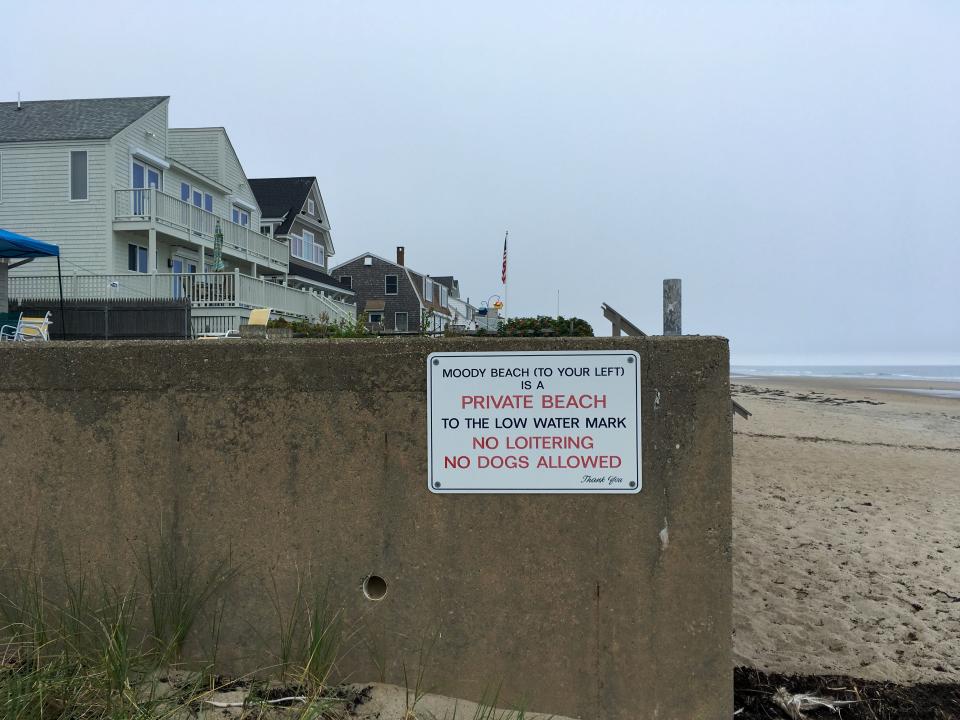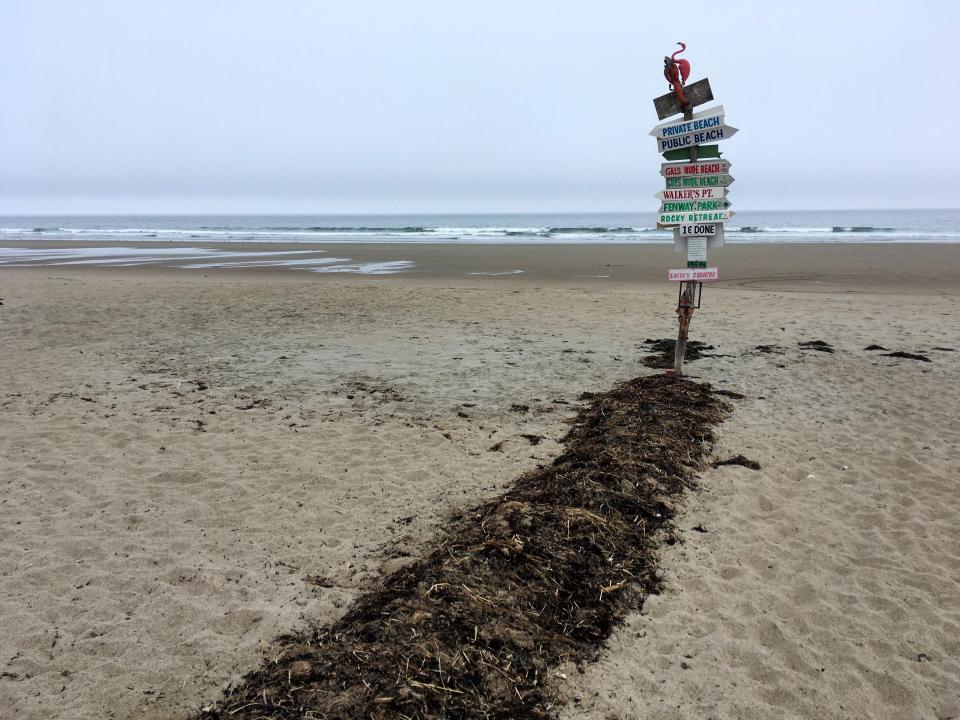Can Moody Beach property owners bar public from land that isn't taxed? Advocates say no
WELLS, Maine — Advocates for public beaches are feeling bolstered by their discovery the owners of intertidal properties in Wells are not paying taxes on the land they've prevented people from enjoying for years.
For a local group, Our Maine Beaches, the claim is the latest development in a longstanding case, still being litigated, about whether the public should be able to enjoy a wide variety of uses in three intertidal areas along Moody Beach that property owners are asserting are their own private land.
Intertidal zones are stretches of beaches between the high- and low-water marks.

Attorney Benjamin Ford, who represents Our Maine Beaches, said he and his fellow researchers drew their conclusion about the absence of tax payments on intertidal zones a few weeks ago when examining the property records of the three landowners named in their lawsuit: Judy’s Moody, LLC, OA2012 Trust, and Ocean 503, LLC.
Previous story: Judge allows portion of Maine beach intertidal zone access suit to move forward
During an interview on Aug. 22, Ford wanted to make clear what he and Our Maine Beaches are asserting about the three plaintiffs they are challenging in court.
“In fairness, it’s not that they haven’t been paying taxes,” Ford said. “It’s that they’re not being billed.”
According to Wells Town Manager Michael Pardue, the town assesses the concentrated value of a beachfront property from its road to its seawall. The value of intertidal zones cannot be captured due to the ebb and flow of tides, he added.
"We value the property as stated in the deed," Pardue said.
Attempts to reach attorneys representing the property owners were unsuccessful.
In a press release on Aug. 18, Our Maine Beaches said one examined record showed one of the properties fronting Moody Beach as measuring 7,261 square feet. Using a “simple online measuring tool” and a satellite photo, the attorneys measured the lot only from the street to the seawall, or the portion that is above the mean high tide. In doing so, they say they came to roughly the same measurement: 7,233 square feet.
“These property owners are claiming to own all the way to the low tide line,” Ford said. “But if you measure the land all the way to the low tide line, it would be three or four times the size listed in the tax records.”
Ford said examinations of other records of properties along the beach produced the same results.
“These records show that these individuals do not pay a dime in taxes to the town of Wells for what they claim to be a private beach,” Ford said.

According to Ford, his researchers also investigated whether the price of the land per square foot was higher because the land was situated on the claimed private beach. Ford said they compared the price per square foot of the Moody Beach lot with lots of a similar size on Wells Beach, a public beach. The two prices were nearly identical, Ford said.
“If they actually paid taxes on the land they claimed to own, their tax bill should be three or four times higher than it is today,” Ford said.
Emboldened by its claims, Our Maine Beaches held a march and a rally at Moody Beach on Aug. 19.
Generally, municipalities vary when it comes to whether or not they tax intertidal zones affiliated with private beachfront properties, according to Kennebunkport Town Assessor Becky Nolette.
"The most important thing is consistency," said Nolette.
If, for example, a municipality taxes down to the low-water mark of one beachfront property, then it must do so for all beachfront properties in the community, she added.
Nolette refrained from discussing the assessing procedures in other communities but did speak of the one in hers.
"In Kennebunkport, we do not assess down to the low-water mark," Nolette said.

Even a few years ago, when Kennebunkport was involved in its own public-private court case involving homes and intertidal zones at Goose Rocks Beach, the town only assessed beachfront properties down to sea walls, Nolette said.
The state does not weigh in on assessing such properties, according to Nolette.
More: How The Colony is reinventing itself with a new hotel building and a year-round market
What does this mean for the lawsuit?
Ford said he did not know if his determination would have any concrete legal bearing on the case brought forth by Our Maine Beaches. He added, however, the conclusion he and others have drawn supports their case in principle.
“The facts on the ground add moral support to the legal arguments we are making in court: the intertidal land belongs to the people of the state of Maine,” he said. “It always has, and it always will.”
The case has a long history, with the latest developments occurring as recently as this spring.
Back in May, Our Maine Beaches asked the Maine Superior Court for a ruling that asserts many uses of the state’s beaches and intertidal lands are legal and allowed under current law. The court has not yet ruled on the request.

In its motion, Our Maine Beaches stated that legal language going back to colonial times clearly intended to protect many public uses along the coast.
Ford wrote that public authorities wanted to “permanently protect” beaches for everyone when they crafted language and laws more than 300 years ago. Back then, Ford added, all uses of beaches could be “neatly summed up in three words: fishing, fowling and navigation.”
Ford noted that circumstances change over time and argued that it is “just common sense” that, as beach usage evolved over the centuries, the law’s original intent “was always meant to be preserved.”
The motion listed 36 activities, from scientific research to birdwatching to building sandcastles, and argued that each one is included in a “key definition,” accepted by the courts, that spell out the public’s right to use beaches and intertidal lands.
Carriage House Motel: New owner has big plans for historic hotel in Wells, Maine
Lawsuit filed in 2021, but dispute goes back decades
In April 2021, Ford filed a lawsuit in Portland that sought to return private beaches along the Maine coast to the public. The plaintiffs included both commercial and recreational beachgoers, and the suit took aim at eight defendants, including the three from Wells.
Residents Peter and Cathy Masucci, of Wells, are among Ford’s clients. Others live in such communities throughout Maine and also in Massachusetts.
In summer 2021, attorneys for the owners of private beaches filed motions to dismiss the case altogether.
In April 2022, Superior Court Justice John O’Neil granted the motion to dismiss the case, as it pertained to intertidal land owners in Harpswell and Friendship who were in a dispute with individuals who were harvesting rockweed on their property for commercial purposes.
Coast Encounters: How to count the bubbles on sea spaghetti with Coastal Carol
But O’Neil also gave Ford and his clients a lifeline. When it came to the three Wells defendants, the judge only granted their motions to dismiss in part – asserting that the property owners did indeed own their intertidal land but leaving vague the question of what constitutes acceptable public use.
Our Maine Beaches saw the opening and filed that motion for a summary judgment in May.
In an interview at the time, Ford said his clients want to correct what they believe is a judicial error that the court made regarding land at Moody Beach in the 1980s.
In 1984, homeowners along Moody Beach in Wells accused local and state authorities of failing to treat beachgoers on their private beaches as trespassers. The homeowners asked the court to prohibit the public from using the beach in front of their properties, not only on the dry sand but also the intertidal zone, according to a report on public shoreline access produced by the Maine Sea Grant College Program, the Maine Coastal Program, and the Wells National Estuarine Research Reserve.
Two years later, the Maine Supreme Judicial Court ruled the colonial ordinance enacted in the 1640s is part of Maine's common law. That ordinance had acknowledged private ownership of beachfront property as including the intertidal zone, extending all the way to the low-tide mark. It had also recognized the public's right to fish, fowl and navigate on privately owned tidelands, according to the report.
In 1989, in Bell v. Town of Wells, known as the Moody Beach case, the state's top court ruled that the only public rights recognized in intertidal areas are those that were outlined in the colonial ordinance: fishing, fowling and navigating.
That means beachfront property owners along Maine's coasts have property rights all the way down to the low-tide area, except for an easement to allow the public to engage in those three permitted activities.
Ford said Maine courts have addressed a “nearly continuous string” of cases involving intertidal lands since the 1989 decision.
Ford once more asserted that the public should have a right to enjoy intertidal spaces, but added that those who own them should pay taxes for them.
“So long as they say they own the land, they should pay taxes on it,” he said. “You shouldn’t be able to call the police to escort grandparents and children off your beach unless you’re paying taxes on it.”
This article originally appeared on Portsmouth Herald: Our Maine Beaches: Land that's not taxed must be open to public

